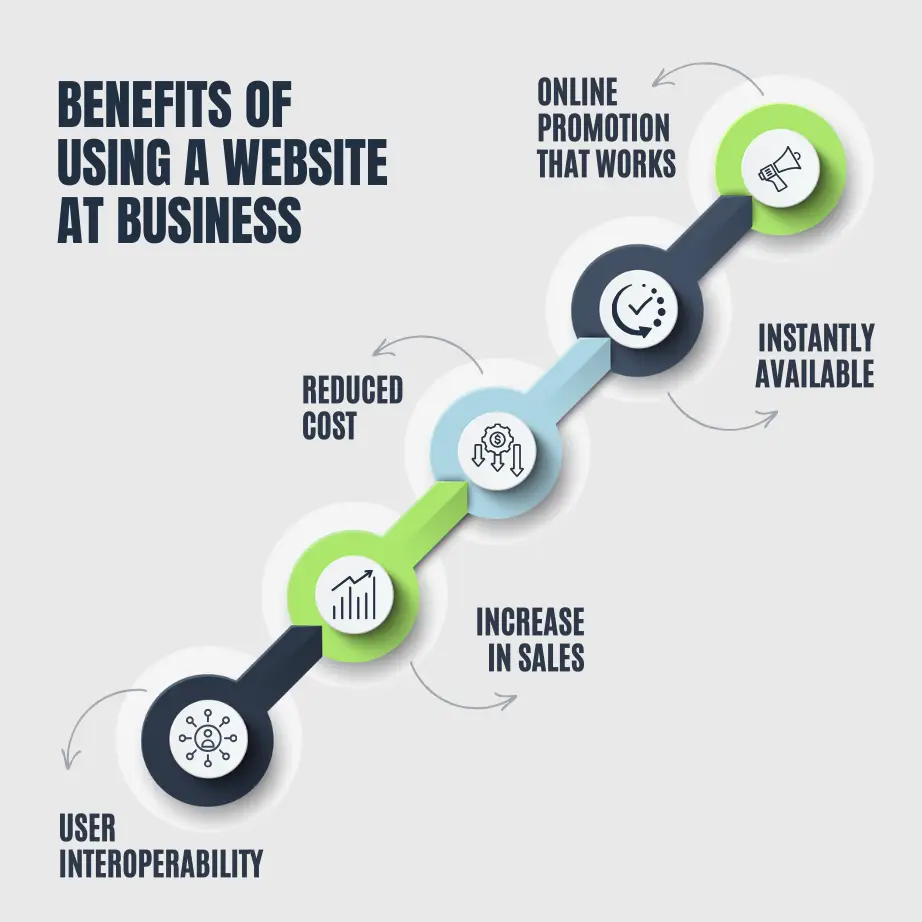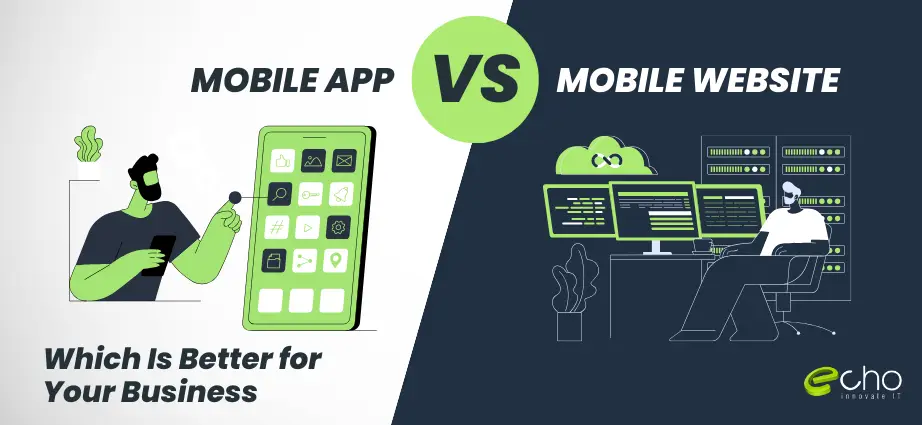In 2024, a solid online presence has become more crucial for people and companies. Selecting between mobile websites and mobile applications for effectively developing their business is one of the most significant problems facing entrepreneurs today.
With millions of mobile apps and over a billion websites, mobile marketing is gaining popularity for companies to communicate with their target audience and promote their products. The choice between mobile websites and apps is based on several variables, including budget, desired audience, individual objectives, and business requirements. Creating a website may be simpler than developing a mobile application from scratch.
Mobile Websites vs. Mobile Apps: Meaning And Features
A website specifically created to be seen and used on a mobile device, such as a tablet or smartphone, is a mobile website.
A mobile website is simplified to concentrate on the most crucial information and functions for a small screen, in contrast to a standard website, which may have a lot of features and information. This results from larger buttons, more straightforward navigation, and quicker loading times.
Mobile websites can be created for various purposes, such as shopping, personal blogs, promoting brands and services, etc. For example, Echoinnovate IT is a custom mobile app development company that offers various cost-friendly IT-based services to its clients in India and the USA.
Some Essential Features of a Website
- Unique Web Address And Content: A mobile website has a URL address visitors enter to access the website. It should be simple to spell and recall. It also has content or data for visitors. It should be well-written, educational, and engaging to your intended readership. There’s quick and easy navigation for visitors to find what they want. A menu with straightforward navigation is essential.
- Mobile-friendly Design: Since mobile devices account for most online traffic, your website must be responsive and work effectively on tablets and smartphones.
- Contact Information: Provide a contact form, your phone number, or email address to make it simple for people to contact you.
- Call To Action And About Us Page: Tell visitors what they should do next, whether sign up for a newsletter, make a purchase, or contact you. This page introduces visitors to your brand, mission, and team.
Security, search functionality, blogs, FAQs, high-quality videos and images, etc., are other essential features.
Also Check:
What is a Mobile App
A mobile app is a software application designed to run on a mobile device such as a smartphone or tablet. Mobile apps are downloaded and installed from Google Play (Android) and the App Store (Apple), where they undergo rigorous testing for security and quality before being made available to customers.
Mobile apps typically focus on one or a few related functions, ranging from playing a game to checking your bank account or editing images. With millions of apps accessible, each serves a distinct purpose. For businesses looking to develop high-quality mobile applications, partnering with the top Android app development company in the USA can provide the expertise and innovation needed to create standout apps that meet users’ needs and preferences.
Essential Features of a Mobile App
- Intuitive User Interface (UI) and User Experience (UX): The software should be simple to access and use, with a clear and uncluttered interface. People should be able to figure out how to accomplish their goals swiftly and without frustration.
- Fast Loading Times: Nobody loves waiting for an app to load. A well-designed app should launch and run smoothly, without lags.
- Security: Mobile apps that handle sensitive information, such as financial or health data, require robust security features to preserve user privacy.
- Basic Functionality: The app’s primary function should be adequate. Whether social media, online retail, or gaming, it should provide a positive user experience in its primary domain.
Mobile Websites vs Mobile Apps: Learning The Key Differences
Everyone knows what and how exactly a mobile website or mobile app works. But understanding what’s best for your business can be a bit challenging. To help you get better clarity, let’s understand it through a comparison table mentioned below:
| Factors | Mobile Websites | Mobile Apps |
|---|---|---|
| User Experience | Like smartphone apps, websites have limits and cannot access key device resources | Mobile apps provide a better user experience because they allow access to a device's fundamental functionalities |
| Focus Area | Provide visitors with information and other static stuff | Offer a service and dynamic content to users |
| Discoverability | Search engines | Various app stores |
| Connectivity | Needs internet connection | It can be used offline or with an internet connection |
| Development Phase | Development is far more straightforward since information is mostly static and text-based | You require specific development to create an app for each platform |
| Storage Use | Websites do not use mobile devices to store data because it is saved on servers | To run a mobile app, your users must first install it on their mobile device, and data is stored in the device's storage |
| Accessibility | Mobile web pages work with all devices | Apps are accessible to the audience that owns smartphones and tablets |
| Deployability | There is no need for installation; it is immediately accessible through the web browser | Users must first install it on their mobile platform, after which it will be accessible |

User Interoperability
Everyone knows what and how exactly a mobile Web Development Company in USA or mobile app works. But understanding what’s best for your business can be a bit challenging. To help you get better clarity, let’s understand it through a comparison table mentioned below:
Increase In Sales
It goes without saying that having a website improves sales. You will receive more than typical free traffic and purchases. You may reach out to clients that prefer to shop through an online store and make it easier for them to buy from you. Sales may increase as consumers prefer organizations that offer quick and convenient online purchase experiences.
Reduced Cost
A website can be a cost-effective solution for businesses of all sizes. A website allows you to save money on traditional advertising, printing, shipping, and rent.
Your website can also automate appointment scheduling, customer care, and sales processes. This allows you to provide excellent customer service while focusing on other business-related responsibilities.
Instantly Available
When you have a website for your business, customers can view it at any time. The advantage of creating a mobile website is that it will reach a larger audience through search engines.
A website can help you improve the customer experience, increase conversions, and digitally expand your business. Thus, when compared to mobile applications, you have a better probability of getting visitors to visit your mobile website.
Online Promotion That Works
Having a website can improve SEO rankings in a variety of ways. A well-designed and optimized website with relevant content, effective keyword usage, and high-quality backlinks can assist search engines like Google comprehend your website’s purpose and rank it higher in search results.
Additionally, a website makes it easier to integrate on-page SEO components such as header tags, title tags, and meta descriptions across several web pages. This connection improves your website’s exposure and reputation on search engine result pages (SERPs).
Advantages of Creating A Mobile App
1) Open To Customization
Mobile apps make personalization easy. After downloading and installing the app, clients can choose what type of data they want to share with the company. Aside from the necessary data requirement, a user can choose whether to transmit GPS location at all times, audio and video features, and so on. Thus, an app always offers a more personalized user experience than a mobile website.
2) Offline Availability
The most fundamental advantage of having access to mobile apps is that you do not require an internet connection. As a result, your users will have easier access to information from anywhere, at any time, without the requirement for an internet connection. However, this is not true for all applications.
3) Building Trust With Customers
While your mobile app can serve multiple tasks, including a loyalty or rewards program can reward repeat orders and foster customer loyalty. Provide concrete incentives in exchange for these repeat purchases.
When customers post your brand on social media, provide them with additional prizes, promotions, or discounts. You can also use rewards program data to recommend more relevant products and encourage repeat purchases.
4) Getting Reviews And Feedbacks
Adding a feedback option will allow you to learn more about the app’s performance and areas for development. Furthermore, it aids in detecting your users’ difficulties. This allows you to gradually develop your mobile apps. It will have a direct impact on your users’ engagement ratio and build client loyalty to your brand.
5) Creating A Strong Brand
Developing a mobile app might help your company establish a stronger brand. A mobile app can act as an ever-present brand ambassador with the correct design and communication strategy. It also offers the right service to the consumer at the right moment, allowing your firm to constantly deliver on its brand promise.
Final Words
Mobile apps and mobile applications are equally essential to make your brand shine and create a solid online presence. This article can help those people who are at the initial stage of mobile marketing and want to explore its powers for better and higher user engagement. As we have already discussed the benefits and features of both, the final decision comes to one’s own needs and business requirements.
Whether you have decided to create a website or mobile application for your business, a top mobile app development company can help you reach the next level. If you need clarification about how to begin, we are here to help.
FAQs-Mobile Websites vs. Mobile Apps: Which Is Better for Your Business
What are the main differences between mobile websites and mobile apps?
Mobile websites are accessed through a web browser and provide static information, whereas mobile apps are downloaded and installed on devices, offering dynamic content and access to device features.
Which is more cost-effective: developing a mobile website or a mobile app?
Developing a mobile website is generally more cost-effective because it requires less specialized development and can reach users on all devices with a single version, whereas mobile apps often require separate development for different platforms.
How does user experience differ between mobile websites and mobile apps?
Mobile apps typically offer a superior user experience because they can utilize device-specific features like cameras and GPS, whereas mobile websites are limited to the capabilities of the web browser.




